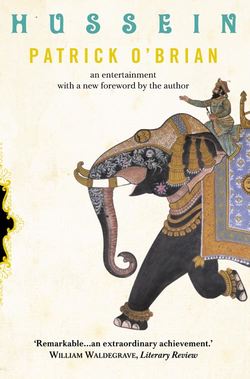Читать книгу Hussein - Patrick O’Brian - Страница 10
На сайте Литреса книга снята с продажи.
Six
ОглавлениеAfter a week it was obvious that he had come by no permanent injury, and in no long time he came out of hospital quite whole again.
Jehangir received him with great joy; the elephant had become thin and anxious, for although Hussein had been away from him before for more than a month, he had felt that something was wrong, and had gone off his feed.
Hussein went to his hut; it was just as he had left it, except that a letter lay on the floor. He ran to it, hoping that it might be from Sashiya. All that it said was: ‘If you go to see Sashiya again we shall beat you more seriously.’
The writing — it was in Urdu — was not that of anyone he knew. It looked like that of someone who was accustomed to writing, and that narrowed things down a bit. For a long time he meditated, lying on Jehangir’s back while the elephant wandered slowly about by the banks of a pool, picking out tender branches from among the bushes. Suddenly Hussein had an idea.
‘It is probably a letter-writer,’ he thought. There was one of these always seated by the Temple of Hanuman, near the elephant lines. He was a fat Bengali: Hussein showed him the letter. ‘I might know something about it,’ he said, ‘but of course I could not tell you anything — my work is most confidential.’
Hussein dropped some money negligently: the scribe covered it with his foot, trying hard to feel how much it was before imparting any information.
At length he said, ‘Now that I come to think about it, it seems to me that that is the writing of Abd’Arahman, who writes in the Krishnavi bazaar. Yes, I feel quite sure of it.’
Hussein went into the city, to the bazaar of Krishnavi, and he found Abd’Arahman the letter-writer sitting before his pen-case and paper.
‘Peace upon your house, Imâm,’ he said, squatting in the dust.
‘Salaam aleikum, hâthi-wallah,’ replied the old man courteously, who knew Hussein well.
‘A friend and I,’ said Hussein, ‘have had a dispute about the Q’ran. Now we have agreed to seek the arbitration of one whose judgment is infallible and whose learning is as deep as the well Zem-zem. So I have come to one who is not only a hadji, but also an Imâm.’
Abd’Arahman stroked his long white beard: he swelled with pride. ‘What little learning I may have,’ he said, ‘is always at the service of the Faithful.’
‘The point, then, of our disagreement is in the Sura called “The Ant”, wherein it is related that Suleiman ibn Daoud (on whose soul be peace) desired to know who among his followers would fetch him the throne of Balkis, Queen of Saba, and two answered him. Then it is related that the throne appeared instantly before him, but it is not said by whom the miracle was performed; is it not so?’
‘Assuredly.’
‘Now I contend that it was performed by the Wazir Asaf ibn Barrachia, the true believer, who answered saying, “I will bring it unto thee, in the twinkling of an eye”. Whereas he obstinately holds that it was done by the Djinni Dhakwan, who said, “I will bring it unto thee, before thou arise from thy place”.’
‘You are both wrong. It was performed by the Suleiman himself. As Al Beidâwi says in … And so I have shown, neither the Djinni, who was an Afreet and an unbeliever, nor the Wazir, who was a man full of evil, being a politician, performed this wonderful exploit. Allahu Akbar!’
‘I hear and am dumb,’ replied Hussein, awaking from his doze. ‘By the name of Allah, I wish that my friend had been here that he might have been confounded, for I fear that he will close his ears against me when I tell him that he is wrong, being an obstinate creature and full of all manner of vice.’
The Imâm smiled. ‘But you may still defeat him, O excellent Hussein, for I shall write my conclusion with ink upon a fine piece of paper, that you may show it to him.’ The old man did so, and Hussein poured forth his thanks.
